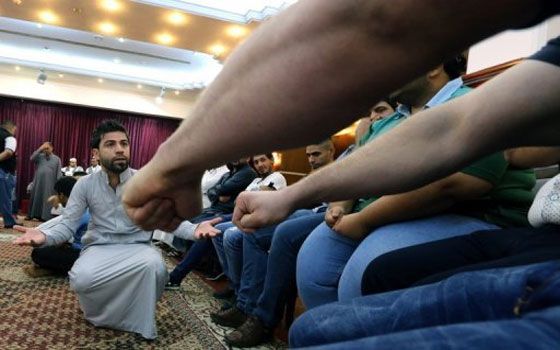Mheibis: an age old Iraqi tradition
It doesn’t matter who you are or where you’re from in Iraq, all of us know that Mheibis (محيبس) is part of our Iraqi heritage. Mheibis is often organized outdoors accompanied by a cold glass of tamar hind. The game almost always ends up in a 7afla, singing and dancing – whether you’re part of the winning team or not. Especially during Ramadan from Iraq’s south to its north people unite after iftar and play mheibis to secure the plate of baklava that awaits the winning team, which is eventually shared by all.
Mheibis championships
Mheibis ('hide ring') is an age-old Iraqi game that involves two teams with each team attempting to hide the ring from the other. The game starts with a player going around the team to give the ring to one person, trying to prevent the other team from knowing which player holds the ring. The other team must then nominate a player who has only one guess to find out who is holding the ring. This player can rule out as many players as he wants as long as he’s convinced that they don’t hold the ring. The moment a player rules out a hand holding the ring, the ring is exposed. All decisions are based on the expertise of studying the facial expressions and gestures of each team member. Mheibis sometimes continued until dawn - sometimes even until noon, until one team finally won. One time during the 1990s when a mheibis game took place on the last day of Ramadan, it continued the whole night. Upon realizing at daybreak that Ramadan had ended, the two sides postponed the rest of the game to the following year.
Due to the popularity of the game the government used to organize championships, hosting hundreds of participants and bringing together Iraqis from across the whole country. Although this state-sponsored practice was halted during wartime, mheibes has made a return in recent years by individual community members that continue to pass forward the tradition.

Mheibis and reconciliation
Widespread violence of the US occupation and its affiliated conflict led not only to the curfew that required all Iraqis to be in their homes during the night-time hours, but has also walled off neighboring communities. For example, the Tigris River separates the Adhamiyah from the Kadhimiya quarter in Baghdad. During the peak years of the war, the A'immah bridge (جسر الأئمة) that used to connect the two quarters was closed for several years. Immediately after the re-opening of the bridge in 2007/2008 Iraqis from both quarters organized a mheibis game. This event reflects the reconciliatory spirit of the Iraqi people. It clearly shows the link between mheibes and the looming of great social relations between Iraqi citizens of the near and far regions. "We just want to be together, we don't care about winning" is at the end the overall attitude of all Iraqi Mheibis players.
